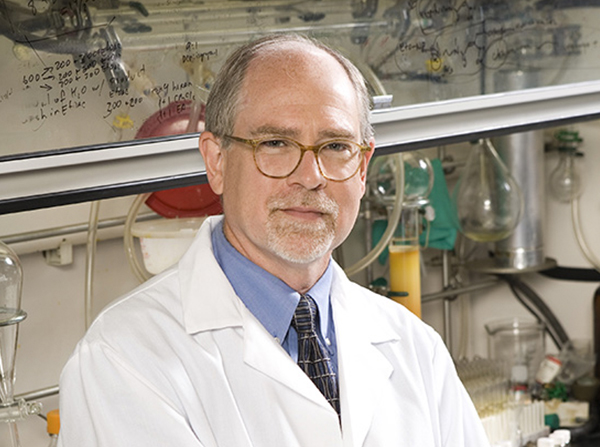
Mark Davis (Photo/Courtesy Mark Davis)
Davis, one of the few academics selected to the National Academy of Engineering (1997), the National Academy of Science (2006) and the National Academy of Medicine (2011), will hold a Provost Professor appointment at USC, with a primary academic home in the Mork Family Department of Chemical Engineering in the USC Viterbi School of Engineering. He will be based at both the University Park Campus, at the soon to open new Michelson Center for Convergent Bioscience, and at the Health Sciences Campus of USC.
In addition to his USC Viterbi appointment, Davis also will hold joint appointments in the Department of Medicine at the Keck School of Medicine of USC, as well as the Department of Chemistry in the USC Dornsife College of Letters, Arts and Sciences.
Davis’ research efforts involve materials synthesis in two general areas: zeolites and other solids that can be used for molecular recognition and catalysis, and polymers for the delivery of a broad range of therapeutics. He also conducts pioneering work on engineering nanoparticles for cancer therapeutics.
During his time at Virginia Polytechnic Institute & State University (Virginia Tech) from 1981 to 1991, Davis and his research team invented a number of new zeolites and molecular sieves. They were the first to report the synthesis of a molecular sieve with uniform pore sizes larger than 1 nanometer. In recognition of his work, Davis became the first engineer to ever receive the NSF Alan T. Waterman award in 1990.
In 1995, while at Caltech, Davis expanded the focus of his research to biomaterials for cancer research. He did so in response to his wife’s long, painful but ultimately successful, fight against breast cancer.
Davis and his team became the first researchers to successfully engineer nanoparticles that are made from polymeric materials specifically designed and created for human cancer therapeutics. To date, three different nanoparticles invented by his lab have gone to numerous human cancer clinical trials that have been and are being conducted both in the U.S. and throughout the world.
At USC, Davis will continue his groundbreaking work on engineering nanoparticles that can deliver drugs to the brain, research that began in recent years and could improve the treatment of brain cancer, Parkinson’s and Alzheimer’s diseases, among other conditions. At Caltech, he and his team discovered how to successfully design nanoparticles that safely cross the blood-brain barrier in rodent models. Their work continues on the pathway to clinical translation of these nanoparticles that if successful, would be a major medical breakthrough.
Davis also will serve as a strategic adviser to the deans of Viterbi and Dornsife, and will mentor faculty and students on convergent bioscience and engineering. As part of his duties at the Keck School, Davis will serve as co-director of the MD/PhD program.
“The connection between engineering and medicine is really a focal point for me,” Davis said. “At USC, I will work on trying to be a conduit to help people do translational medicine, especially in the area of therapeutics.”
“Mark Davis is a stellar addition to our faculty,” Provost Michael Quick, PhD, said. “His multidisciplinary scholarship and research is an asset to the USC Michelson Center for Convergent Bioscience — where we are building bridges across our campus to transform medicine and science. I know he will help move us forward in these efforts. We are looking forward to his expertise and guidance.”
“We are truly excited to have such a superb engineer and scientist as Mark Davis join USC. We are eagerly looking forward to his leadership in advancing the rapidly accelerating convergence between engineering and medicine,” said Yannis C. Yortsos, PhD, dean of the USC Viterbi School of Engineering.
“We are delighted to welcome Mark to the Keck School family,” said Rohit Varma, MD, MPH, dean of the Keck School and director of the USC Gayle and Edward Roski Eye Institute. “He will be a tremendous resource for our MD/PhD program. His visionary work that converges the disciplines of technology and health/medicine will inspire our students to innovate and create at the forefront of translational science.”
Amber D. Miller, PhD, dean of USC Dornsife College of Letters, Arts and Sciences, said, “USC Dornsife extends a warm welcome to Provost Professor Davis. We greatly benefit from his strong record of leadership, innovation, and expertise in creating synergies across scientific fields.”
Davis has written more than 425 scientific publications, two textbooks and holds 75 U.S. patents. He is a founding editor of “CaTTech” and a former associate editor of “Chemistry of Materials” and the “AIChE Journal.”
Over the decades, Davis has won a raft of awards, including the Colburn and Professional Progress Awards from the AIChE and the Somorjai, Ipatieff, Langmuir, Murphree and Gaden Prizes from the ACS. In 2014, he received the Prince of Asturias Award for Technical and Scientific Research from the King of Spain, and in 2015, he was elected to the National Academy of Inventors.
A scientist with an entrepreneurial bent, Davis founded Insert Therapeutics Inc., Calando Pharmaceuticals Inc., a company that created the first RNAi therapeutic to reach the clinic for treating cancer, and Avidity Bioscience.
Apart from his scientific achievements, Davis attained All American Status for Masters Track and Field in the 400, 200 and 100 Meter Dashes. In 2011, he won the 400 Meter Dash for men of age 55-59 at the Masters World Championship.
He holds three degrees from the University of Kentucky, all in chemical engineering.
— Marc Ballon